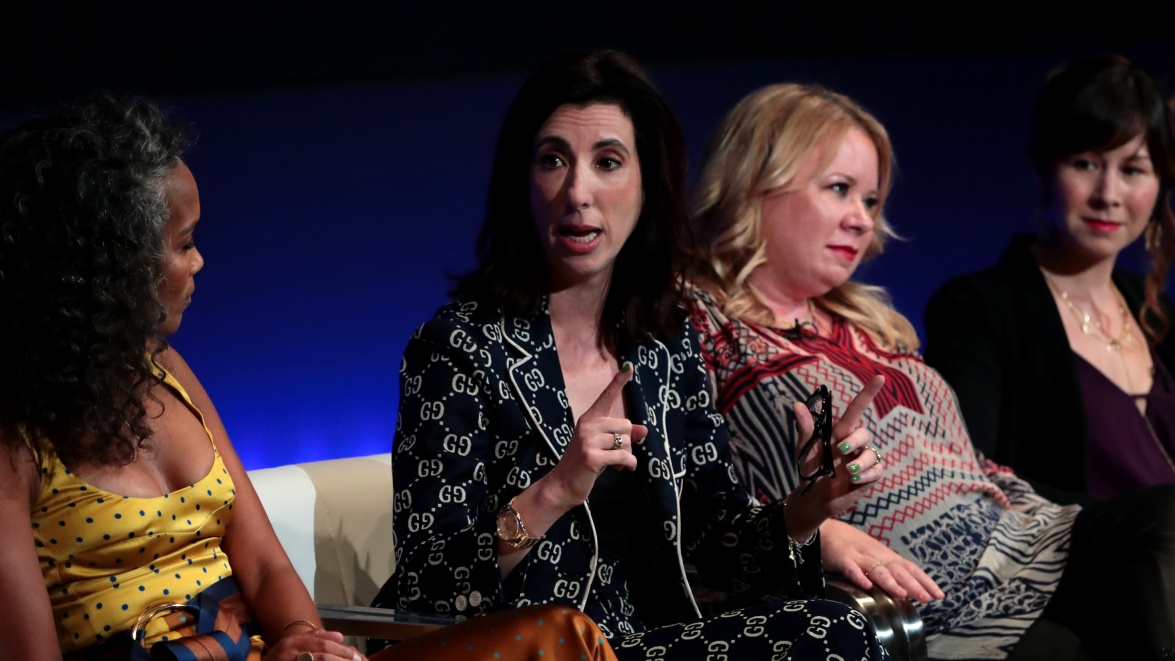Aline Brosh McKenna Talks Changes Still Needed on #MeToo Anniversary: ‘It Is Still 50-Year-Old White Men’ In Charge
By Rachel Yang
LOS ANGELES (Variety.com) – Although writers’ rooms have become more diverse in the last few years, the heads of networks or studios are “still in a bubble” when it comes to conversations around #MeToo and Time’s Up, believes “Crazy Ex-Girlfriend” co-creator and showrunner . And ultimately, they wield the most power when it comes to diversity in a series.
“You walk into those rooms, and you are aware that it is still 50-year-old white men who are in charge,” McKenna said during a panel on inclusivity and representation held Sunday. “I want to see these companies, these corporations that we work for say, ‘I heard you, this is not okay.’”
McKenna was among 10 executive producers from various CW series, including Mara Brock Akil (“Black Lightning”), Nkechi Okoro Carroll (“All American”), Julie Plec (“Legacies” and “Roswell, New Mexico”) and Jennie Snyder Urman (“Charmed” and “Jane The Virgin”) who participated in the panel moderated by Debra Birnbaum, Variety’s executive editor of TV. Eight actresses from various CW shows who are also spearheading the Shethority movement, including Melissa Benoist and Nicole Maines (“Supergirl”), Tala Ashe (“DC’s Legends of Tomorrow”) and Candice Patton (“The Flash”), participated in a second panel with Birnbaum. They discussed their campaign for female empowerment and also touched on how the #MeToo and Time’s Up movements have impacted their industry. The event at Warner Bros. Studios’ Steven J. Ross theater in Burbank also highlighted CW’s partnership with #SeeHer, a movement striving for accurate portrayals of women in the media.
Although Akil stated that showrunners can help hire diverse writers and producers and “change television and entertainment on its head in a year or two tops,” some of the others said there are many obstacles that stand in the way, from budget restrictions to the close-minded executives that McKenna mentioned. “Arrow’s” new showrunner Beth Schwartz told Variety that true diversity in television has to start “from hiring from the bottom,” because women can then rise through the lower-level positions and get to the top.
Many of the actresses also said there needs to be more done about female representation that go beyond simply “checking a box” for hiring women or women of color. Ashe told Variety when she got cast, the showrunners also hired a Muslim American writer to help get across the complexity of her character. Additionally, Patton said she wants diversity to reverberate across every department of a show.
“It’s not enough to make a black woman a female lead of your show, you then have to write for that character, you have to make sure there are hair and makeup artists who know how to do black hair and makeup. You have to have producers who understand the black experience in Hollywood,” Patton said during the panel.
However, the women have all acknowledged positive changes since #MeToo and Time’s Up erupted in the last year. A number of the producers said there has been more sensitivity in the writers’ room since these movements, and they are more cautious to ask writers privately if a storyline is offensive.
Similarly, Patton said the conversations that have happened about gender equality recently have made it easier to talk openly about previously taboo topics. “I feel less afraid every day. I think the way the tide is turned, I’m less afraid to get on set and have conversations about whatever — about the things that I need as a woman, or equal pay or whatever it is. I feel less afraid because I know there are other women and other men who get the shift that’s happening and will have my back.”
McKenna added that she hopes there will be more female executives and wants to “bathe women in some of the entitlement that men have” so more talented women have the confidence to be in charge and create positive ripples throughout an entire network.
“Someone saying to you, ‘I see you this way. I think you can be a [director of photography], I think you can be the president of a studio, I think you can do this, I see this in you,’ is something really powerful,” McKenna said. “We need all different kinds of people who are not white men to feel that sense of ‘I belong here. … I’m not going to ask permission to sit here.’”

